Ruyant wins again on the transatlantic course but his focus remains the Vendée Globe
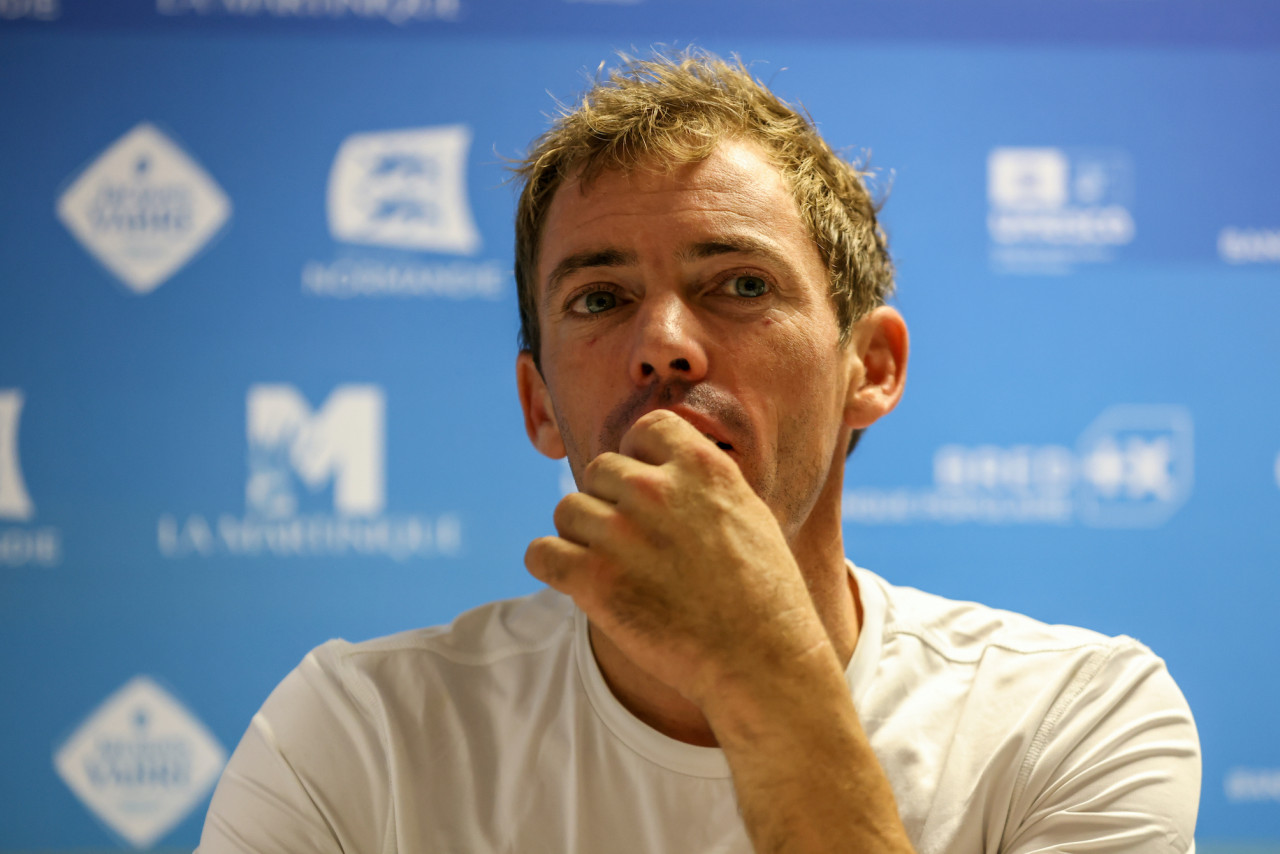
In France they call him “The King of the Transat” and with good reason because, with his dominant victory in the Transat Jacques Vabre-Normandie le Havre today, Thomas Ruyant has achieved what no one else has before him – three consecutive IMOCA transatlantic victories, two double-handed, one solo.
Sailing alongside Morgan Lagravière, Ruyant brought his new Antoine Koch/Finot Conq-designed foiler across the finish line off Fort-de-France just after 2 o’clock in the morning local time, to complete a phenomenal voyage from Le Havre in 11 days, 21 hours and 32 minutes, at an astonishing average speed of 19 knots.
The pair on board For People finished just over four hours ahead of second-placed Yoann Richomme and Yann Eliès on Paprec Arkéa, the sistership of For People, who were just nine minutes ahead of third-placed Sam Goodchild and Koch himself on Ruyant’s old boat, For The Planet.
With two consecutive Transat Jacques Vabre victories in different boats, plus a win in the Route du Rhum, it seems only the Vendée Globe has defied Ruyant who had to settle for sixth place last time out after a race when he was running in the top-three for most of the circumnavigation.
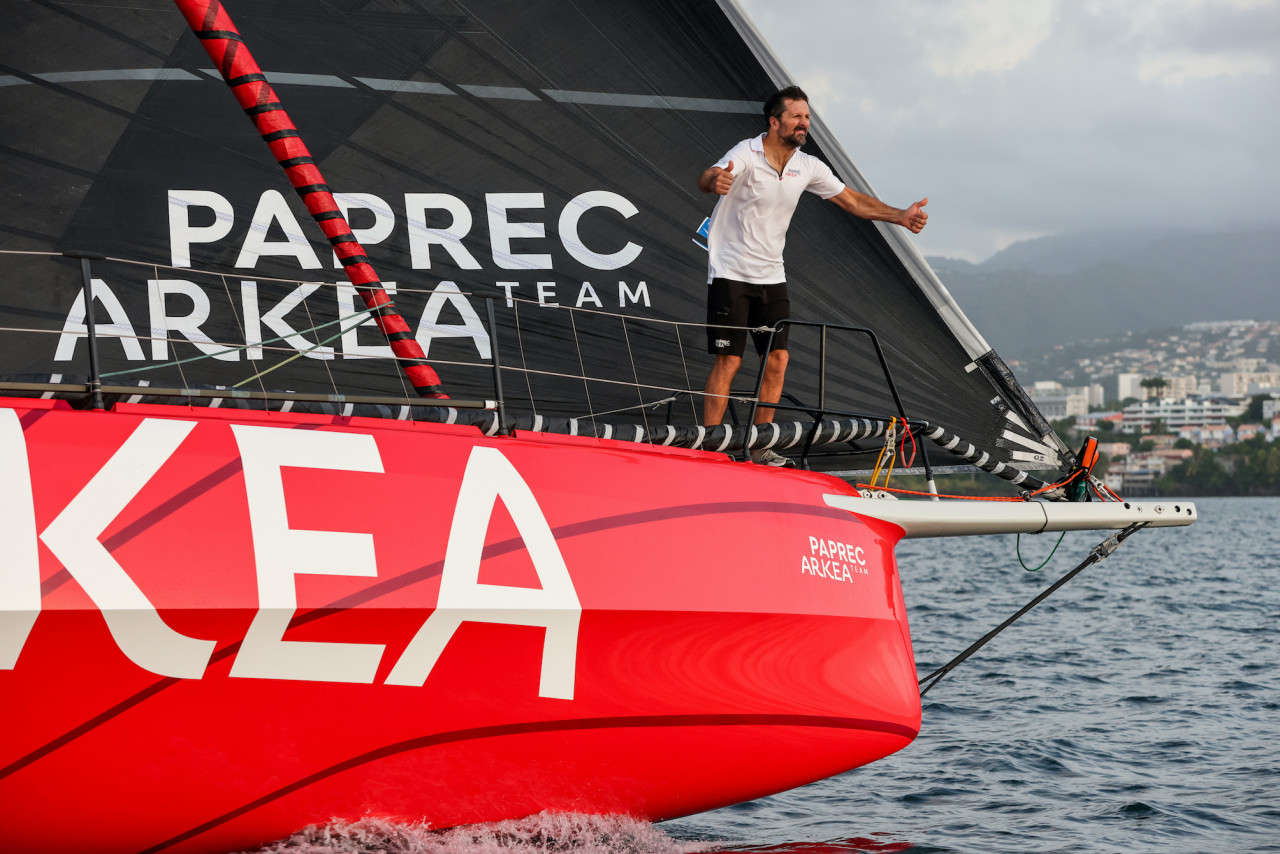 © © Jean-Marie Liot / Alea
© © Jean-Marie Liot / Alea
At the finish this morning, a delighted Ruyant admitted that his long term focus remains the round-the-world challenge. “We work to win,”he said. “I know I’ve won the last three transatlantic races, but the Vendée Globe isn’t a transatlantic race and there are other competitors. That’s the goal and the whole group is working towards it. In the back of our minds, we’re making our boat more reliable for the Vendée Globe. You can’t write the history of the Vendée Globe in advance, but that’s our goal.”
The other thing on Ruyant’s mind was his team – Lorient-based Thomas Ruyant Racing – who had a big battle on their hands to get his boat ready after it suffered serious structural failure at the start of the Rolex Fastnet Race, following on from its victory on debut in the Guyader Bermudes 1000.
“For us the Transat Jacques Vabre didn’t start in Le Havre,”explained Ruyant. “When we broke the boat in July, the whole team pulled together to get it ready for this transatlantic race. Even before that, we’d already started to get a good idea of the boat’s potential, and we needed to consolidate it.”
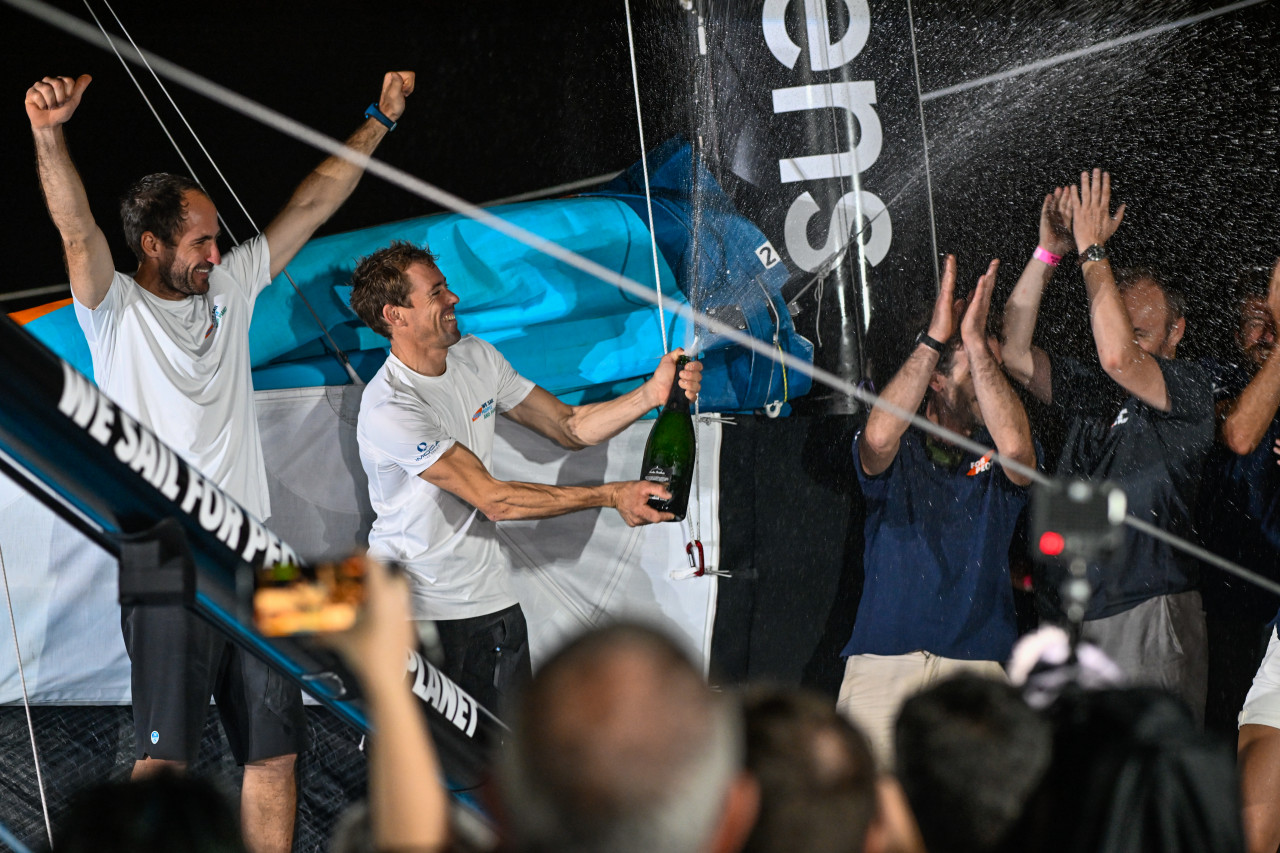 © © Jean-Louis Carli / Alea
© © Jean-Louis Carli / Alea
An intriguing aspect of Ruyant and Lagravière’s performance was the extent to which they relied in the second half of this race on hand-steering a beautifully balanced boat that allowed them to do that for hours at a time. In their battle with Paprec Arkéa, they teased extra speed out of For People by keeping her flying when otherwise she might have fallen off her foils.
While Lagravière spent a lot of time on the helm, Ruyant was using the intelligence he gained to improve his auto-pilot set-up that he will rely on when he goes solo in the upcoming Retour à la Base race and then the Vendèe Globe itself.
“I was concentrating on adjusting the pilot,”explained Ruyant. “And there are certain operating modes that you manage to put in place when sailing double-handed, which I won’t be able to do single-handed. So we were working on the settings to put in place for solo sailing.”
Reaching the dock just a few hours after Ruyant, as the sun rose over Martinique, Richomme was another happy man, even though he had been pushed out of a possible race win by Ruyant and Lagravière over the final week of tradewind sailing. This second place follows his second place in the Fastnet Race in July.
“I think Thomas and Morgan were a level above and we learned so much during this race that I don’t think we could have won – we learned too much in the process,”said the 40-year-old two-time Solitaire du Figaro winner and two-time Route du Rhum winner in Class 40s.
“I think it shows that we still have a long way to go to be able to win races,”he added. “We’re in good positions, we’ve got a good boat and we know how to handle it and it’s fast and stuff, but there’s still quite a bit of work to do to be able to beat skippers like Thomas or Charlie (Dalin) and that’s the next step for us.”
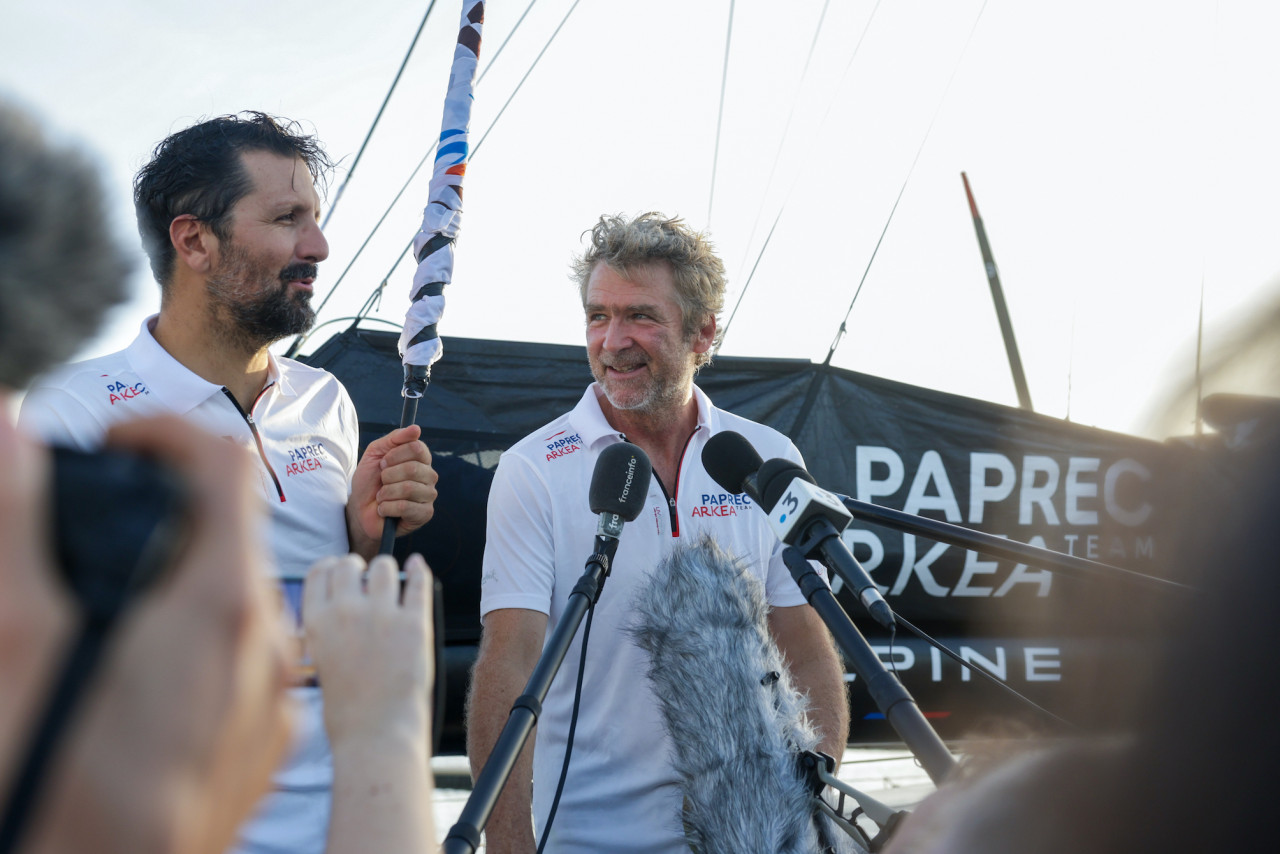 © © Jean-Marie Liot / Alea
© © Jean-Marie Liot / Alea
Richomme said he believes this race and this season will have confirmed in most people’s minds that the two Koch/Finot Conq sisterships are “the best design of this generation”and he is looking forward to racing his new boat single-handed for the first time in the Retour à la Base.
We asked him about hand-steering. Richomme is well aware that it can be quicker on the two Koch/Finot Conq boats that, unlike almost all the others in the Class, do not produce big weather helm when powered up. But his focus was more on setting up his pilot for solo sailing, rather than doing so with Eliès on the helm.
“You do have phases where you are faster hand-steering because the boat does fly and, if you can manage to keep it flying, it does count,” he explained. “But it’s a bit different depending on your objectives, because we do have to learn how to set it up fast under auto-pilot when we are by ourselves, so I wasn’t too keen on doing that too much.”
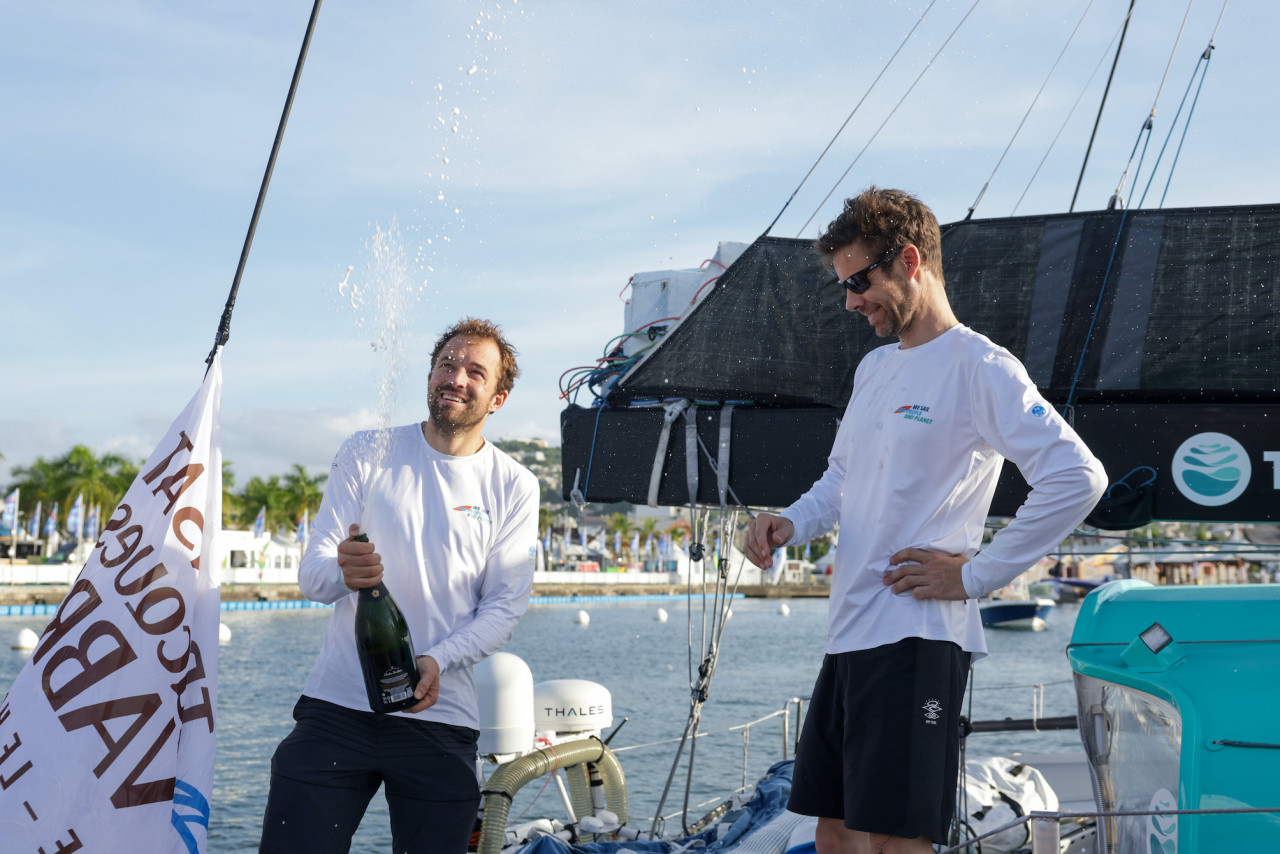 © © Jean-Marie Liot / Alea
© © Jean-Marie Liot / Alea
For Goodchild and Koch, missing out on a Thomas Ruyant Racing “one-two” finish was not really the point. The British skipper has now amassed four consecutive third-placed podium finishes in his first four races on For The Planet and he knows he knows he has a potent weapon in his hands for the Vendée Globe.
“For sure we always want to do better,” said the former Ocean Fifty champion. “We always want to go faster, we always want a better boat, but considering I am starting my IMOCA journey on a boat’s that’s on the podium already, I can count myself lucky to be honest, and I didn’t expect it go this way, even with this boat.”
Goodchild was particularly pleased with the way he and Koch fought their way back into this race after technical issues at the start saw them lose ground on the early leaders. “Even going through the Canaries we weren’t actually in that great a position, but we managed to dig in and get back,” he said. “The (flattish) sea conditions helped us a lot which was obviously good for our boat, because it’s not very good through waves, and we saw in the building conditions of the last 36 hours that we started to suffer.”
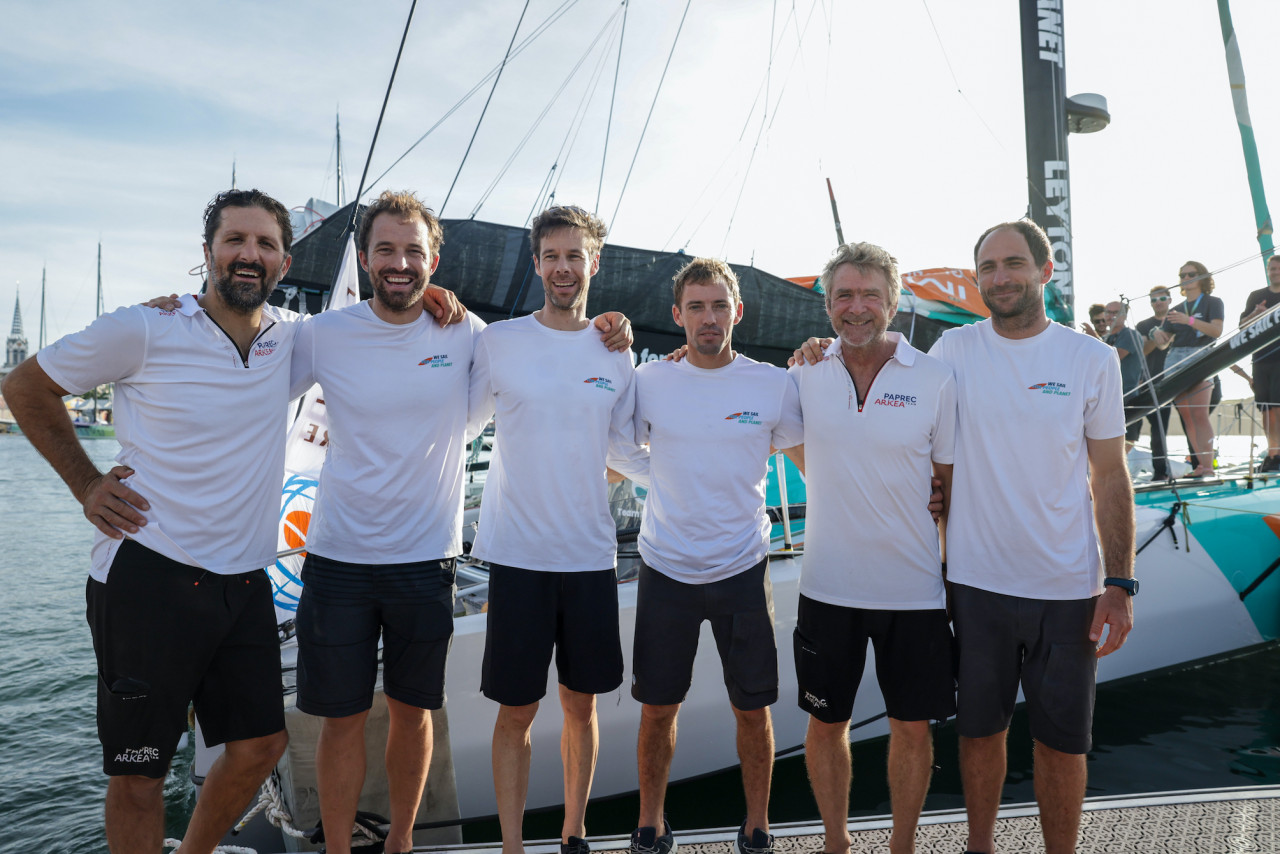 © © Jean-Marie Liot / Alea
© © Jean-Marie Liot / Alea
The British skipper went onto to pay this tribute to his team. “If I am on the podium four times, it is in large part thanks to them,” he said. “If I had just picked up a new boat, or a second hand boat, at the beginning of the year, I would not be where I am now. It’s the fact of being able to take on the boat with all the in-house knowledge which has helped me short-cut a whole bunch of things, whether it’s technical information about what breaks or doesn’t break, whether it’s polars or whether it’s speaking to Thomas about what makes the boat go fast. And Antoine has been a massive element of that because he designed the new boat, and the reference for that was how do we make it better than the old boat.”
Koch’s remarkable performance in this Transat Jacques Vabre – as the co-designer of the first two finishers and co-skipper of the boat coming third – was nicely acknowledged at the finish. The five other sailors that made up the podium lifted him off his feet on the dockside in recognition of his efforts both at sea and in the design office.
Ed Gorman
Teams info
THE LIST OF 40 SKIPPERS UNVEILED
The 2020 edition of the Vendée Globe has generated unprecedented interest. As a result, the organisers decided to increase the number of places at the start to 40 for the 2024 edition. 44 skippers applied for this 10th e…
•••Charlie Dalin: The podium in IMOCA is much harder to reach now
Charlie Dalin has particularly enjoyed his convincing win in the New York Vendée-Les Sables d’Olonne race. And that’s partly because he knows that even getting on the podium in the IMOCA Class is becoming more difficult.
•••